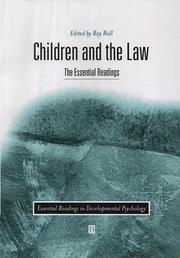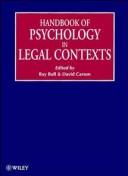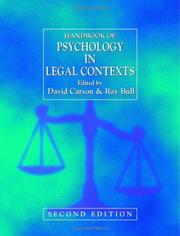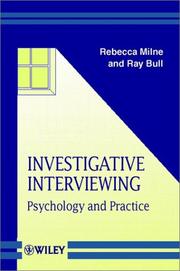| Listing 1 - 10 of 29 | << page >> |
Sort by
|
Book
ISBN: 1461496411 146149642X Year: 2014 Publisher: New York, NY : Springer New York : Imprint: Springer,
Abstract | Keywords | Export | Availability | Bookmark
 Loading...
Loading...Choose an application
- Reference Manager
- EndNote
- RefWorks (Direct export to RefWorks)
Between news stories of coerced confessions and the over-the-top interrogations shown in crime dramas, there seems to be no end of wrong ways to question suspects. And as wrong as these methods are, they are equally counterproductive when the resulting statements are based on questioners' assumptions rather than the truth. The expert pages of Investigative Interviewing model an approach that reflects an ethical base – emphasizing persuasion rather than coercion – as well as the evidence base. International in scope, this innovative volume reflects sophisticated new interview methods and often surprising findings on the psychology of suspects, victims, witnesses, and law enforcement personnel. Topics cross criminal justice settings and contexts, such as when information should be disclosed to suspects, how interviews are conducted in international tribunals, and the emerging concept of human intelligence interviewing. Taken together, these chapters are a leading-edge guide to obtaining statements that stand up as reliable evidence. Included in the coverage: Investigative interviewing of sex offenders. Psychological processes underlying true and false confessions. Between investigator and suspect: the role of the working alliance in investigative interviewing. A training program for investigative interviewing of children. A systematic review of different types of consistency in truth tellers and liars. Prosecutors’ perceptions on improving child witness interviews about abuse. Suited to the researcher and the educator as well as the frontline professional, Investigative Interviewing heralds a major advance in forensics: education and training programs rooted in best practices for more effective interviewing--and consigning excessive interrogations to the fiction writers.
Consciousness. --- Interview. --- Interviewing in law enforcement. --- Interviews as Topic. --- Philosophy (General). --- Psychic research. --- Psychological tests and testing. --- Interviewing in law enforcement --- Police questioning --- Criminal investigation --- Social Welfare & Social Work --- Social Sciences --- Criminology, Penology & Juvenile Delinquency --- Psychology --- Police questioning. --- Criminal investigation. --- Crime detection --- Crime investigation --- Criminal investigations --- Police interrogation --- Psychology. --- Experiential research. --- Psychological measurement. --- Cognitive psychology. --- Psychology Research. --- Psychological Methods/Evaluation. --- Cognitive Psychology. --- Methodology. --- Investigations --- Law enforcement --- Crime scenes --- Detectives --- Forensic sciences --- Questioning --- Apperception --- Mind and body --- Perception --- Philosophy --- Spirit --- Self --- Psychology—Methodology. --- Psychology, Cognitive --- Cognitive science --- Measurement, Mental --- Measurement, Psychological --- Psychological measurement --- Psychological scaling --- Psychological statistics --- Psychometry (Psychophysics) --- Scaling, Psychological --- Psychological tests --- Scaling (Social sciences) --- Research --- Measurement --- Scaling --- Methodology --- Psychometrics.

ISBN: 0631226834 Year: 2001 Publisher: Oxford Blackwell
Abstract | Keywords | Export | Availability | Bookmark
 Loading...
Loading...Choose an application
- Reference Manager
- EndNote
- RefWorks (Direct export to RefWorks)
#KVHA:Recht; Engels --- Jeugdwetgeving; Engels --- Children --- Child witnesses --- Forensic psychology --- Interviewing in child abuse --- Juridical psychology --- Juristic psychology --- Legal psychology --- Psychology, Forensic --- Children as witnesses --- Child welfare --- Legal status, laws, etc --- Legal status, laws, etc. --- Law and legislation --- Law --- Child abuse --- Forensic sciences --- Psychology, Applied --- Witnesses
Digital
ISBN: 9781461496427 Year: 2014 Publisher: New York, NY Springer
Abstract | Keywords | Export | Availability | Bookmark
 Loading...
Loading...Choose an application
- Reference Manager
- EndNote
- RefWorks (Direct export to RefWorks)
Between news stories of coerced confessions and the over-the-top interrogations shown in crime dramas, there seems to be no end of wrong ways to question suspects. And as wrong as these methods are, they are equally counterproductive when the resulting statements are based on questioners' assumptions rather than the truth. The expert pages of Investigative Interviewing model an approach that reflects an ethical base – emphasizing persuasion rather than coercion – as well as the evidence base. International in scope, this innovative volume reflects sophisticated new interview methods and often surprising findings on the psychology of suspects, victims, witnesses, and law enforcement personnel. Topics cross criminal justice settings and contexts, such as when information should be disclosed to suspects, how interviews are conducted in international tribunals, and the emerging concept of human intelligence interviewing. Taken together, these chapters are a leading-edge guide to obtaining statements that stand up as reliable evidence. Included in the coverage: Investigative interviewing of sex offenders. Psychological processes underlying true and false confessions. Between investigator and suspect: the role of the working alliance in investigative interviewing. A training program for investigative interviewing of children. A systematic review of different types of consistency in truth tellers and liars. Prosecutors’ perceptions on improving child witness interviews about abuse. Suited to the researcher and the educator as well as the frontline professional, Investigative Interviewing heralds a major advance in forensics: education and training programs rooted in best practices for more effective interviewing--and consigning excessive interrogations to the fiction writers.
Philosophy --- Cognitive psychology --- Psychology --- History of philosophy --- kindermishandeling --- psychologie --- partita's --- meetinstrumenten (psychologie) --- filosofie --- cognitieve psychologie --- bewustzijn

Abstract | Keywords | Export | Availability | Bookmark
 Loading...
Loading...Choose an application
- Reference Manager
- EndNote
- RefWorks (Direct export to RefWorks)
Legal medicine --- Psychology and law --- Psychology, Forensic --- Law --- -Insanity --- -Criminal insanity --- Insanity --- Insanity (Jurisprudence) --- Lunacy (Law) --- Mental illness --- Mentally ill --- Capacity and disability --- Insanity defense --- Acts, Legislative --- Enactments, Legislative --- Laws (Statutes) --- Legislative acts --- Legislative enactments --- Jurisprudence --- Legislation --- Juridical psychology --- Juristic psychology --- Legal psychology --- Forensic sciences --- Psychology, Applied --- Psychological aspects --- Law and legislation --- Legal status, laws, etc. --- Evidence, Expert --- Forensic psychology. --- Insanity (Law) --- Psychological aspects. --- -Psychological aspects --- Insanity (Law). --- -Juridical psychology --- Criminal insanity --- -Acts, Legislative
Book
ISBN: 0387966072 1461283485 1461237823 Year: 1988 Publisher: New York (N.Y.) : Springer,
Abstract | Keywords | Export | Availability | Bookmark
 Loading...
Loading...Choose an application
- Reference Manager
- EndNote
- RefWorks (Direct export to RefWorks)
Social psychology --- Beauty, Personal --- -Body image --- Face --- -Interpersonal attraction --- Attraction, Interpersonal --- Interpersonal relations --- Human face --- Head --- Pathognomy --- Physiognomy --- Image, Body --- Imagery (Psychology) --- Mind and body --- Person schemas --- Personality --- Self-perception --- Human body --- Beauty --- Complexion --- Grooming, Personal --- Grooming for women --- Personal beauty --- Personal grooming --- Toilet (Grooming) --- Hygiene --- Beauty culture --- Beauty shops --- Cosmetics --- Social aspects --- Body image. --- Interpersonal attraction. --- Social aspects.

Abstract | Keywords | Export | Availability | Bookmark
 Loading...
Loading...Choose an application
- Reference Manager
- EndNote
- RefWorks (Direct export to RefWorks)

ISBN: 0471987298 047198728X Year: 2001 Publisher: Chichester Wiley
Abstract | Keywords | Export | Availability | Bookmark
 Loading...
Loading...Choose an application
- Reference Manager
- EndNote
- RefWorks (Direct export to RefWorks)
Book
Abstract | Keywords | Export | Availability | Bookmark
 Loading...
Loading...Choose an application
- Reference Manager
- EndNote
- RefWorks (Direct export to RefWorks)
Book
Abstract | Keywords | Export | Availability | Bookmark
 Loading...
Loading...Choose an application
- Reference Manager
- EndNote
- RefWorks (Direct export to RefWorks)
Book
Abstract | Keywords | Export | Availability | Bookmark
 Loading...
Loading...Choose an application
- Reference Manager
- EndNote
- RefWorks (Direct export to RefWorks)
| Listing 1 - 10 of 29 | << page >> |
Sort by
|

 Search
Search Feedback
Feedback About UniCat
About UniCat  Help
Help News
News